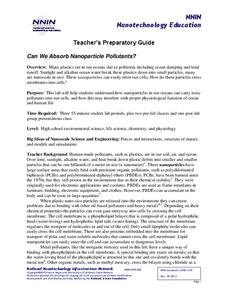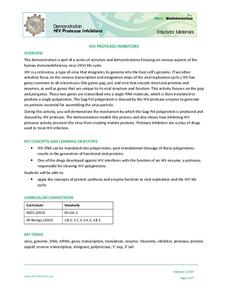Curated OER
Cell Art
Combine art and science with this cell structure assignment. Learners depict a cell diagram, including the organelles, imitating a specific artist's style.
Serendip
Structure and Function of Cells, Organs and Organ Systems
Cells of different organs have unique cell functions. Learn how cell functions vary depending on their roles in the body using an inquiry-based activity. Scholars analyze the cell structure to make comparisons to its functions, allowing...
Lincoln Public Schools
Cell Exploration Activities
Engage young biologists in exploring the mysteries of life with this collection of hands-on activities. Enlisting the help of numerous digital resources, students get an up-close look at the structure of plant and animal...
Teach Engineering
Cell Membrane Color Sheet and Build a Cell Membrane
A cell of another color is still a cell. Pupils color a cell to identify its structures in the fourth segment of a seven-segment series. Groups work together to build a three-dimensional cell membrane segment, which is combined with...
Curated OER
Cell Membrane / Transport Drawing Project
Biology buffs illustrate the workings of the cell membrane when they complete this checklist. Not only do they draw the structure, they also draw gradients and mechanisms for the transport of materials across the membrane. Your advanced...
Lesson Plans
Analogy of the Cell Project
Intended to supplement your existing cell function and organelle lessons, pairs work together to develop a real-world analogy for cell structures. In addition to writing paragraphs about the comparison, each group will make a short...
Curated OER
What Are Cells?
Energize the cells of young biologists with an edible life science activity. Engaging students in exploring the inner workings of plant and animal cells, this activity involves using colored jello and various sweet and...
Grand Erie District School Board
Model Cell Project
If you're finishing up a unit on cells, here's a great project to get kids collaborating and recalling what they've learned in a fun and tangible way. Small groups create plant or animal cells out of materials they have at home. They use...
Curated OER
3-D Cell Model
Life science laureates choose a plant or animal cell to construct a model of as an at-home project. This handout provides guidelines, suggested materials, and a grading rubric for their reference. A full-page letter to parents is also...
MOST
What Are Cells?
What's in a cell, anyway? Kids read informational text on what makes up both animal and plant cells, including a page of vocabulary terms they will need to be familiar with (cytoplasm, ribosomes, vacuoles, etc.). Full-color images...
Serendip
DNA Structure, Function and Replication
Before a cell replicates, its DNA must replicate. Take advantage of a hands-on guided lesson to teach budding scientists how this happens. Using a set of nucleotide cards, learners become the DNA and work to create matching strands...
National Nanotechnology Infrastructure Network
Can We Absorb Nanoparticle Pollutants?
Just because we can't see it doesn't mean it isn't there! A growing concern for environmental scientists is toxic nanoparticles in our air and water. Young scholars conduct an experiment to demonstrate how these particles can cross our...
Howard Hughes Medical Institute
Viral DNA Integration
How do reverse transcriptase inhibitors work? Young virologists examine the function of azidothymidine, a drug doctors use to treat HIV patients, during a hands-on modeling activity. Groups create a strand of DNA from an HIV RNA strand...
Forest Foundation
The Nature of Trees
Young botanists examine the different parts of tress and then draw parallels between the functions of these parts and the function of parts of the human body.
Serendip
DNA
Get up close and personal with DNA! A two-part hands-on activity has learners extract DNA from a small organism and then their own cheek cells. Scholars then explore DNA replication using questions to guide their analyses.
Serendip
UV, Mutations, and DNA Repair
How effective are cells at repairing UV damage? An inquiry-based instructional activity has learners experiment with organism by exposing them to various levels of UV light and then examining their DNA after a period of time. Pupils test...
Howard Hughes Medical Institute
HIV Protease Inhibitors
How do doctors fight a virus that's constantly mutating? Show science scholars how we fight HIV using one of its own most fundamental processes through a thoughtful demonstration. The lesson focuses on how protease inhibitors prevent HIV...
Serendip
From Gene to Protein via Transcription and Translation
DNA carries the codes for creating just the right protein. A well-designed lesson leads pupils through the process from start to finish and everywhere in between. Guiding questions with supporting video help scholars understand the...
Serendip
The Molecular Biology of Mutations and Muscular Dystrophy
Different types of mutations cause unique types and degrees of muscular dystrophy. Scholars learn about the types of mutations and the impact on the body. They compare the location of the mutations and draw conclusions about how it is...
Serendip
Soap Opera Genetics – Genetics to Resolve Family Arguments
Did she cheat on her husband? Did the hospital switch the babies? Should they have children? As much as this sounds like the plot for a soap opera, all of these questions fit into a single lesson on genetics. Scholars read about three...
Nature Research
Nature Education: Scitable: Essentials of Cell Biology
Explains how cells send and receive signals. Includes a quiz that can be completed after free registration.
Texas Instruments
Texas Instruments: Cell Structure/function
This StudyCards stack enables students to review information about the organelles of eukaryotic plant cell. They are tested on their ability to describe the structure, location, and function of different cell organelles.
ibiblio
Ibiblio: The Virtual Cell: Cell Biology
In this interactive site, you are presented with a picture of a cell and a description of the structure and function of the parts of the cell. Pictures are colorful and the explanations are short but informative.
TeachEngineering
Teach Engineering: Cell Membrane Color Sheet and Build a Cell Membrane
Students color-code a schematic of a cell and its cell membrane structures. Then they complete the "Build-a-Membrane" activity found at http://learn.genetics.utah.edu. This reinforces their understanding of the structure and function of...























